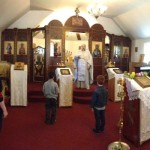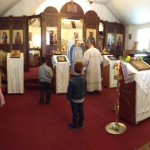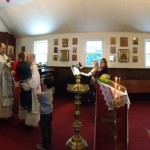On June 1, on the Sunday of the Holy Fathers of the First Ecumenical Council, St. George Church’s Rector, Archpriest Igor Tarasov served the Divine Liturgy. After the reading from the Holy Gospel he preached a homily:
“These days we live after the feast of the Ascension of the Lord and before the celebration of Pentecost. We are under the impression of the glorious lifting up of our Lord into heaven, and, at the same time, we are expecting the Descent of the Holy Spirit. In the same way, holy Apostles were experiencing this double feeling. They were missing their Teacher who ascended from them into heaven, and they were expecting the promised Holy Spirit to come down upon them. Thus this was a special time for the Apostles, a time of being together, joined in a constant prayer, waiting for the Holy Spirit.”
“Today’s Sunday the Church dedicates to the Holy Fathers of the First Ecumenical Council. This is so because the First Council was the result of the Church life after the Apostles. It showed that Christian community needs certain hierarchical authority and definition of true faith. Otherwise, many false teachings and errors may come and spread among Christians. In today’s Gospel lesson our Lord Jesus Christ is praying for His followers that they may be preserved in truth and have eternal life (Jn. 17, 1-13). That truth became endangered when a lot of false teachers appeared among the Christians right after the time of the Apostles. They began to proclaim erroneous opinions about God and about Christ. These teachings are called heresies. This is why the Ecumenical Councils had to define Orthodox faith, the right belief in God and Christ.”
“Despite the Councils and despite the labors of the Holy Fathers the heresies appeared again and again. The communities of the people who called themselves Christians but in fact had deviated and departed from Christ, multiplied. We may be wondering about this but we should read the Scripture carefully. It tells us that all this was supposed to happen. Today’s Epistle lesson describes how St. Paul preached to the elders of the early Church. He tells them: “Take heed to yourselves and to all the flock, among which the Holy Spirit has made you overseers, to shepherd the church of God which He purchased with His own blood. For I know this, that after my departure savage wolves will come in among you, not sparing the flock. Also from among yourselves men will rise up, speaking perverse things, to draw away the disciples after themselves” (Acts 20, 28-30). We may ask how the Church of Christ could divide into different denominations. But the Scripture told us all about this. St. Paul warned his followers about this in today’s Epistle lesson.”
“Our Lord Jesus Christ purchased us with His own precious blood. But it does not preserve us from going astray. People tend to make mistakes and to fall into errors. Christian communities had always been attacked by strange teachers whom St. Paul calls “savage wolves not sparing the flock” (Acts 20, 29). In the early times these were the influences of paganism or Judaism which attempted to penetrate into the Christian thought. They created numerous heresies of Gnostics or of the communities practicing Jewish customs. In our times these are the influences of different pagan religions, secular philosophies or just the spirit of this world which invades the minds of Christians. St. Paul also mentions that from among Christians “men will raise up, speaking perverse things, to draw away disciples after themselves” (Acts 20, 30). And this was fulfilled many times when among Christian communities, even among the clergy appeared some individuals or groups of people who began to preach false teachings and to draw the Christians away from the true Church. These were a lot of heresies which started to appear in the early times and continue to arise. These people claim to be Christians, but they deviate from Christ and went away from Him. The Scripture is being fulfilled in them. When you drive through a typical American town you may see several different churches, Baptist, Evangelical, Methodist, Adventist, or even so-called “the Churches of Christ”. Who are they? They call themselves the followers of the same Jesus Christ, however they teach differently, pray differently and live differently. They are the followers of those men who once arose among true Christians and began to speak perverse things, leading true Christians away. Not only St. Paul, but our Lord Jesus Christ Himself warned against them saying, “Beware of false prophets, who come to you in sheep’s clothing, but inwardly are ravenous wolves” (Mt. 7, 15).”
“Therefore, dear brothers and sisters, let us beware of the false teachings! Let us be grateful to the Lord who purchased our souls with His own precious blood, who gave us eternal life. And, as He says, eternal life is to know the only true God and His Son, Jesus Christ (Jn. 17, 3). Thus, let us desire eternal life by knowing our true faith, by adhering to the holy Orthodoxy defined by the Holy Fathers of the Councils. Let us fervently pray along with St. Paul of today’s Epistle lesson that we may be commended “to God and to the word of His grace, which is able to build you up and give you an inheritance among all those who are sanctified” (Acts 20, 32).”



